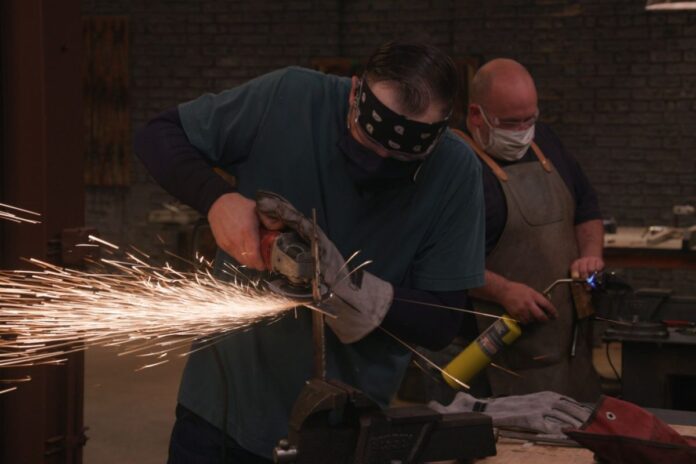The eleventh installment of Forged In Fire has confined the viewers to the edge of their seats alongside the baffling query of whether it’s a scripted show.
Forged in Fire is a TV show on the History Channel created by Outpost Entertainment, a Leftfield Entertainment company.
Highlights
- Forged in Fire is as much about testing the contestants’ skills under pressure as it is about time management.
- Folks criticized the show’s focus on drama over realistic blade-making processes.
- Season 11 could be a chance to make Forged in Fire fairer by considering changes to address concerns about fairness.
In the series, four bladesmiths battle it out in a three-round competition to craft bladed weapons.
The winner of each episode earns $10,000 and the prestigious title of “Forged in Fire Champion.”
The show often faces criticism for its lack of authenticity, with scenes being scripted or reshot to fit a narrative.
However, former contestants of the show attest that certain aspects remain genuine.
A Quality Sword Is Time-Consuming, Given That Forged In Fire Is A Reality Show
A Reddit user, unfamiliar with smithing but an avid viewer of Forged in Fire, expressed confusion after watching a blacksmith on TikTok.
They claimed that crafting a quality sword could take several months.
Also, they questioned whether the contestants on the show were producing inferior swords
Or if the TikTok blacksmith simply took an exceptionally long time to complete his work.
As a whole, Forged in Fire is as much about testing the contestants’ skills as it is about time management.
The judges often stress the importance of managing time effectively.
Contestants recreate historical weapons and put their blades through rigorous tests.
Winning doesn’t mean the loser is bad or the winner’s blade is the best—it’s more about showcasing skill under pressure.
Another Reddit user shared insights from knowing two Forged in Fire contestants, revealing that while both were skilled, neither won first place.
They criticized the show’s focus on drama over realistic blade-making processes, noting the absence of crucial steps like proper tempering.
Their disillusionment with reality TV stemmed from firsthand experience seeing contrived filming practices.
Forged In Fire Season 11 Review
Forged in Fire is more of a game show than an accurate depiction of blade-making.
It imposes tight time constraints on contestants to see if they can create usable items within that timeframe.
While the show is entertaining, it may give viewers the wrong idea that all knives are made quickly. It isn’t true.
The time it takes to make a sword depends on various factors, such as size, materials, design, and the smith’s experience.
It’s true that many competitors face challenges like rolling edges or poor weight distribution. It may indicate that more time is needed to refine their work.
However, there are also smiths who manage to create excellent swords within the given time frame.
Somehow, my perspective aligns with that of a Reddit user who expressed concerns about the fairness of the final challenge on Forged in Fire.
I feel that having the final challenge at the contestants’ forges creates an unequal playing field.
This setup may give contestants an advantage by giving them access to better-quality equipment at home rather than showcasing their overall skill.
For example, one contestant has only basic equipment, while another has access to high-end tools.
Season 11 might offer an opportunity for changes to be made to address concerns about fairness in Forged in Fire
Additional Information
- The show features a host, previously Wil Willis for the first seven seasons and currently Grady Powell.
- There’s also a three-judge panel comprising J. Neilson (Jason Knight and Ben Abbott also participated in various seasons), David Baker, and Doug Marcaida.
- These judges are experts in weapon making, history, and usage, bringing a wealth of knowledge to the evaluation process.



